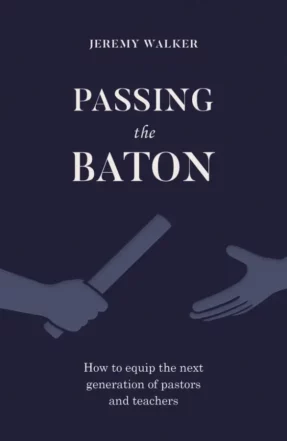
These two short books on these vital subjects are so wisely and biblically written that I wish all churches and aspiring pastors would read and implement them. Jeremy Walker writes from years of personal experience as a biblical scholar and the pastor of a local church.
Passing the Baton
The book starts with 14 horror stories which Walker proceeds to counteract through the rest of the book. He writes, ‘A righteous response requires biblical deliberation, deep-rooted conviction and principled action. He refers to Paul’s instruction to Timothy in 2 Timothy 2:2, speaking of this in terms of ‘real mentoring’ and ‘as a model of in-house, hands on equipping for ministry’. He speaks of this in terms of investment.
Walker treats the issues he tackles skilfully and biblically. For example, in his chapter on personal investment, he draws on how so many biblical characters invested in another, including Moses with Joshua, Elijah with Elisha, Christ and his disciples and Paul with many others.
Some challenging words bring the book to a close: ‘How long after we pass from this world will someone remember who we are… It is not our name that they need to know. It is the name of Jesus Christ.’ ‘If the work is slow, hard and disappointing. Do not give up!’
Providing for Pastors
In this book, Walker addresses the subject of pastors’ remuneration head-on. It is done very well with clear biblical principles. He bases everything he says in the local church, calling our giving, ‘a holy culture of voluntary sacrifice’.
The author uses extensive scriptural references, especially Galatians 6:6 and stresses that he is ‘addressing the responsibility of true churches of Jesus Christ to provide financial support for the men who faithfully watch out for their souls.’
He speaks to pastors who need to ‘teach the whole counsel of God’ regarding pastoral support but guard their own attitude towards money. He speaks to deacons who need to make sure their pastors are properly cared for and he speaks to church members who need to be generous in their faithful giving.
He mentions visiting preachers, pensions and housing provisions all set in the context of biblical principles. He even includes support for evangelism, smaller churches and missions.
In the last chapter Walker leaves us with those challenging words in Haggai, ‘Is it time for you yourselves to dwell in your panelled houses and this temple to lie in ruins?’